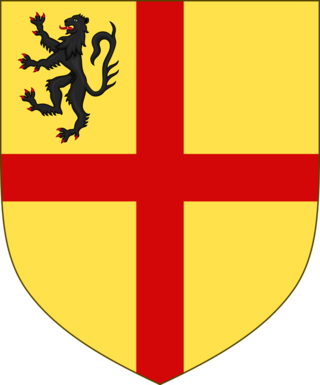William Óge Martyn was the 101st Mayor of Galway.

William de Burgh, 3rd Earl of Ulster and 4th Baron of Connaught was an Irish noble who was Lieutenant of Ireland (1331) and whose murder, aged 20, led to the Burke Civil War.

Richard Óg Burke, 2nd Clanricarde or Mac William Uachtar was an Irish chieftain and nobleman who was the son of Sir Ulick Burke or Uilleag de Burgh, 1st Clanricarde (d.1343/1353).
Sir Edmund de Burgh was an Irish knight and ancestor of the Burke family of Clanwilliam.
Richard Sassanach Burke, 2nd Earl of Clanricarde, styled Lord Dunkellin until 1544, was an Irish noble who succeeded his father Ulick na gCeann Burke, 1st Earl of Clanricarde as chief of a Gaelicised Norman family with authority over much of what is now County Galway. Richard's nickname was Sassanach "Englishman", because he took the English part during the Tudor reconquest of Ireland.
Dominick Lynch was mayor of Galway, Ireland.
Maelsechlainn mac Tadhg Ó Cellaigh, King of Uí Maine, Chief of the Name, was a leading participant in the Battle of Knockdoe, fl. 1499–1511.

John "na Seamer" Burke, Baron Leitrim, also known as John of the Shamrocks, was one of the notorious half-brothers called the meic an Iarla, whose conflicts with each other and their father, Richard Burke, 2nd Earl of Clanricarde, caused devastation to south Connacht several times between the late 1560s and early 1580s.
Edmond Albanach de Burgh, 1st Mac William Íochtar was an Irish chieftain and noble who established himself as the most powerful lord in Connacht west of the Shannon.
John MacSeonin Burke or John de Burgo, O.S.A. was an Irish Roman Catholic cleric who was Archbishop of Tuam (1441–1450).
Roland de Burgo was an Irish Church of Ireland cleric who was Dean of Clonfert, Bishop of Clonfert (1534–1580) and Bishop of Elphin (1551–1580).

Redmond Burke, Baron Leitrim was an Irish noble and soldier who served in Spain and later in Ireland during the Nine Years' War.

John mac Richard Mór Burke, 10th Clanricarde or Mac William Uachtar, was an Irish chieftain and noble.

Ulick Fionn Burke, 6th Clanricarde or Mac William Uachtar was an Irish chieftain and noble.

Ulick Ruadh Burke, 5th Clanricarde or Mac William Uachtar was an Irish chieftain and noble who was the son of Ulick an Fhiona Burke, 3rd Clanricarde (d.1424).

William mac Ulick Burke, 4th Clanricarde or Mac William Uachtar was an Irish chieftain and noble.

Ulick an Fhiona Burke, 3rd Clanricarde or Mac William Uachtar was an Irish chieftain and noble who was nicknamed an Fhiona.

Tomás Óg de Búrca, 5th Mac William Íochtar was an Irish chieftain and noble who was lord of Lower (North) Connacht, Ireland.

Theobald Bourke, 8th Mac William Iochtar was an Irish chieftain and noble who succeeded his cousin as lord of Lower (North) Connacht, Ireland.

Richard Óg de Burgh, 2nd Earl of Ulster and 3rd Baron of Connaught, called The Red Earl, was one of the most powerful Irish nobles of the late 13th and early 14th centuries and father of Elizabeth, wife of King Robert the Bruce of Scotland.



